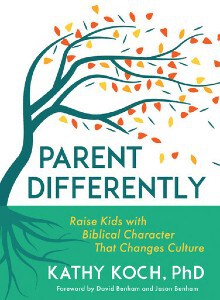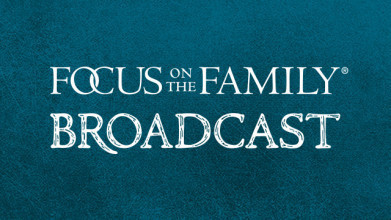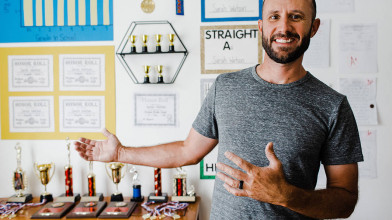Dr. Kathy Koch: Let’s say I want my kids to be generous with their spirit and their stuff and their time and their, their passion. What are the other things that would need to be addressed? And maybe as a family we sit down, and family values, our whole family wants to become more generous. What are the other qualities that are gonna be related to that that we need to look for, build up, and talk about? And it makes it, I think, less overwhelming because we don’t have to teach 48 qualities like we teach the ABCs separately.
Jim: Yeah.
Kathy: We can teach them together and it makes us rich. It makes it more likely that we will become more like Christ and exhibit this biblical character that I, I want them to parent differently for.
John Fuller: That’s Dr. Kathy Koch and she joins us to discuss how to build character in your children on today’s episode of Focus on the Family. Your host is Focus president and author Jim Daly and I’m John Fuller.
Jim Daly: John, we all want our children, uh, to do well in this world, to serve others and to love the Lord. We do want that sincerely. But children, they’re not born, necessarily, with that desire to do good-
John: Hmm.
Jim: … to everyone around them. It’s something that we need to instill in them. And, uh, Jean and I certainly tried to communicate that. We did that in a variety of ways with a variety of measures of success.
Kathy: (laughs).
Jim: Um, you know, one of the things we did was volunteer work, we went (laughs) and, I’ll never forget this, um, shoveling out manure at a, uh, animal rescue center. That was fun.
John: Hmm.
Jim: I remember Trent and Troy weren’t quite into that (laughs) as much. But volunteering and doing those things f-foster care work. I mean, we got the kids involved, especially as they got older. They were really great with the foster kids, so learning to love people in brokenness-
John: Yeah.
Jim: … and things. So, how about you? What did you do?
John: Uh, same kinds of things, open our eyes, let’s look around, uh, shovel the, the elderly neighbors’ sidewalks, uh, look for those opportunities to serve.
Jim: I should’ve thought of that one.
John: (laughing). There was a day I went out and fi- I had five kids shoveling snow for the neighbors. We were, we were kind of a popular family for that.
Jim: (laughs).
John: But, uh, doing things like mission work and, uh, uh, some of those things worked well, others didn’t, but my kids all seem to have a, a real heart for others. So.
Jim: Yeah.
John: … uh, in some regards, we did see some success.
Jim: That’s so good.
John: Yeah.
Jim: And having that mature and positive character is so important to instill in your children, especially in the culture that we live in today. I don’t believe, and maybe I’m just that older generation, that anything good is happening in schools. I’m sure there’s many good things happening, but how do they pick these things up?
John: Yeah.
Jim: First and foremost, they’re gonna pick them up at home.
John: Hmm. Well, we have a great, uh, to talk about, uh, raising kids and character, Dr. Kathy Koch is back with us. She’s a very popular speaker and author and is the founder and president of Celebrate Kids Inc. And, uh, she’s passionate about helping build character and resilience in our families. Uh, she’s been on, uh, this show many times and has written a great book that really forms that foundation for our conversation today. It’s called Parent Differently: Raise Kids with Biblical Character That Changes Culture. And this is a terrific resource, stop by the website to learn more, focusonthefamily.com/broadcast.
Jim: Kathy, welcome back.
Kathy: I’m thrilled to be here, thanks for the invitation.
Jim: It’s always good to have you here. I go our inspired and, uh, now that my boys are in their early 20s and kinda going, “Oh, I miss doing that one.”
Kathy: Hmm.
Jim: Or, “I miss doing that.” So this is that great kind of, preventative thinking about what parents should concentrate on.
Kathy: Mm-hmm.
Jim: So we’re grateful for all the years you poured into getting your PhD and-
Kathy: Aww, thanks.
Jim: … all the counseling sessions that you’ve had. I mean, it all culminates into great resources-
Kathy: Hmm.
Jim: … books that you’ve written, so always good to have you here.
Kathy: Thanks. It’s an honor that God would allow me to do what I do. I sometimes stand before audiences-
Jim: Yeah.
Kathy: … and I’m just stunned that anybody listens to me.
Jim: (laughs). Oh, isn’t that funny?
Kathy: It’s, it’s so much fun.
Jim: Yeah.
Kathy: Yeah.
Jim: Well, that’s called humility, which is a great cr- characteristic, right?
Kathy: Yeah, it’s-
Jim: Of kids.
Kathy: … one of the top 13, you’re right about, yeah.
Jim: Hey, let me, this opening story was so funny that I got out of your book. You had this little incident where you had luggage lost by an airline twice on one trip?
Kathy: Twice. (laughs)
John: Oh.
Jim: And it, it kinda got under your skin. I’m laughing ’cause I’ve got a similar story, but go ahead, tell yours.
Kathy: Yeah, I normally don’t check a bag for obvious reasons, but I was on multi-event trip, so I had checked a bag. And at two of the places I arrived without that suitcase and it was frustrating, of course, so I’m in line at 5:30 in the morning to take the next flight on my itinerary, thinking, “I bet the suitcase is here. I bet they just didn’t deliver it to the bed and breakfast.” And so, I’m in line, way too many people in line, canceled flights, so lots of people, 5:30, one person at the desk. And I get up there and I’m thinking, “This is not gonna be good, ’cause I’m gonna have to slow everything down to ask about my bag.” And I’m becoming inside a little bit impatient like everybody around me but I’m trying really hard to not show it ’cause I’m a Christian-
Jim: (laughs).
Kathy: … and I wanted to be a good girl. And up from the side walks a woman, “Are you Kathy Koch? This is so embarrassing, I don’t mean to embarrass you but are you possibly Kathy Koch?”
Jim: (laughs).
Kathy: And I don’t know what you guys do when that happens to you, but I’m like, “Well, yes.”
Jim: (laughs).
Kathy: And then she’s like, “Your podcast is amazing. When is your new book about character gonna be out?”
Jim: Yes.
Kathy: So I was minutes away from blowing the testimony, right?
Jim: (laughs).
Kathy: When this woman comes up and it was just this reminder that people are watching. Now I think we need stellar character to glorify God. I think a primary reason is that we put God on display, we put the Christlikeness and the Holy Spirit’s leading on display when we behave differently from the people around us. But it is also about us. Character is our reputation, it’s wh- it’s who we are. And, and, and that was profound. And then the rest of the story is, I get on the airplane and I realize that I had been polite, I had said thank you, I w- The, the bag was there, by the way, so I know we can relax, the suitcase was there. And I didn’t say, “Well, why wasn’t it delivered?” I just said, “Thank you.” And again, I don’t want this to be about me but I sat there and I thought, “How did that just happen?” Everybody around me was angry and upset and verbalizing their disgust with the airline and I said, “Thank you.” Well, that was all the character qualities coming together. The only reason you can be patient is because you’re generous and optimistic and other-centered and you think well of people. So that was one of the lessons that framed this book that all the character qualities work together, and you work on one, you work on others, and they all benefit, if that makes sense.
Jim: No, it does. I’m just thinking, there has to be another time that they lost your luggage and you weren’t kind and patient.
John: (laughs).
Kathy: (laughs).
Jim: (laughs) Come on, there’s got to be another time.
Kathy: Is that your story, Jim?
Jim: Well, mine is funny because it was one of the first… I, you know, started at Focus in 1989. So I took a training trip. I was, w- working with the donor community and a colleague, I won’t name him.
Kathy: (laughs)
Jim: But it was probably the best, the best training trip I could have taken. We were at Utah, I don’t know if Salt Lake City or somewhere. And we go to the counter, and they did not have the reservation for the car.
Kathy: Oh!
Jim: And he was very indignant about that. Like, you know, you can make a reservation, but you can’t keep a reservation kind of language. And, you know, he was a little hot. And the person behind the counter goes, “Sir, let me, let me see what I can do.” Then he goes, “Oh, you work for Dr. Dobson in Focus on the Family.”
Kathy: (laughs)
Jim: And I’m just watching the whole thing. Best training lesson I ever had for good reasons, you know.
Kathy: Yeah.
Jim: Be represent the Lord number one-
Kathy: Right.
Jim: … but certainly in Christian work as pastors and everything. And you better, you better be presenting what you believe.
Kathy: I think it’s really easy to get caught up in the moment-
Jim: Oh, yeah
Kathy: And to be caught up in the people around you. And so, for parents who are trying to be self-controlled and really kind, get caught up in their kid’s whining behavior and the kid’s argumentative behavior and they get sucked into that. Like, we’re going to talk about that.
Jim: Oh, yeah. We’re going to talk about it. But let me, let me start with this because I think when it comes to the parenting challenges, sometimes, you know, kids don’t fall far from the tree. So if, if you’re seeing behavior, are you illustrating that behavior, such as the stuff we’re talking about. Y- You may not even think of it as a major problem, you know? It’s my inconvenience, and I have a right to be upset that you lost my luggage or my car reservation, but that’s not a Christ-like way to respond.
Kathy: No, no. Parents absolutely need to be careful of who they are at all times, especially in front of their children, because children do pick up on it, absolutely.
Jim: Probably more about the parent than teachers and everybody else in their life.
Kathy: Well, yes, and…
Jim: (laughs)
Kathy: But we don’t want people to turn off the radio, so let’s-
Jim: (laughs)
Kathy: You know, we don’t want them to feel like, oh, it’s all about me, but it really is all about you. You know, a lot is caught and a lot is taught. And so being a role model of who you hope your kids will be is important, which is why we can talk about family values and so many other things that become the focus, if I can use that word, for what you want for your kids.
Jim: Yeah. You know, uh, this may lean more into a theological question, but you know, Christians generally believe that we’re born with a sinful nature-
Kathy: Mm-hmm.
Jim: … that left to our own devices, we’re going to lean into lying about the cookie we took out of the cookie jar and… You know, it just is present from an early age. And in that way with kids that, where we want our children to have good behavior. Can we instill it or what’s this battle going on between good and evil with a five-year-old?
Kathy: Well, I’m so glad you brought that up. It is a real issue and that’s what we have to teach character. You know, one of the things I often say to adults is we teach… We drill and skill the 1-2-3s. We drill and skill the ABCs and the colors and the shapes and so many things like that. Well, obedience is harder to learn. Character is harder to learn because it goes against the sin nature which is real. We can’t expect kids to just learn by the role model although there’s a positive effect that happens there. Yes, we should be praying for a transformed heart and for a desire to be good and obedient. But we have to teach the difference between patience and impatience. We have to teach the value of respect. We have to teach that. And one of the most important things to teach, Jim, is that you have value. Because you have value, therefore, Christ-like biblical character matters for you. And if kids don’t think they have value, nothing matters.
Jim: Hmm.
Kathy: So we all, we go back to the very beginning, the very beginning of the message of the truth of the scripture that God created you because he wanted you and he wanted you the way you are, and if you don’t become biblical in your character, God will lose.
Jim: Hmm. That’s big. That’s a big statement. Kathy, you speak to this, maybe tension, uh, about beliefs and how they relate to behavior. Why is it important? You’re touching on it. Why is it important to identify, uh, beliefs in your children, maybe even stronger than behavior?
Kathy: Yeah, I appreciate that we’re starting with that question. It’s something that I’ve written about and spoken about so often. You know, how many of us have said to our kids, you know, “Stop arguing, stop arguing, stop arguing.” But it doesn’t help.
John: I’ve never said that. I’ve never seen that. I saw somebody do that.
Kathy: Oh, right.
Jim: I just put up a sign. I make a sign and just hold up the sign.
Kathy: And does it help?
Jim: No, of course not.
Kathy: No. Because why are they arguing? Right? Are they jealous? Then maybe the issue to deal with is jealousy. Are they self-centered? Then maybe that’s the issue.
Jim: Mm-hmm.
Kathy: So behavior, negative and positive behavior is rooted in negative and positive character-
Jim: and belief
Kathy: … and beliefs. So, “Am I worth more than my sister? Therefore, my mom should not have treated my sister that way, right?” “Um, I don’t have to be patient with grandma and grandpa. You know, they can walk their own pace and I can walk however I want, and it doesn’t matter because I’m so important I have to get there first,” versus a child who believes that respecting grandma and grandpa means I hold their hand and walk slow so that they don’t break a hip because their neighbor broke a hip and they’re terrified. So what do I believe about myself and my capability? What do I believe about grandma and grandpa? What do I believe in my role there?
Jim: Yeah.
Kathy: So to dig under the surface. The behavior is observable, but to go under that surface and talk about those things.
Jim: You know, again, you’re a PhD… You’re working with families all the time on correcting behavior, correcting beliefs, teaching parents how to do this. There is to me, uh, within the Christian experience of parenting, we, we stress behavior so heavily.
Kathy: Right.
Jim: You know, sometimes missing heart and belief in what’s at the core. And it really concerns me, and I think we project, we that are addressing these issues, tend to project a perfection that if you get the behavior right, then the heart’s going to be right. It’s exactly backward. Exactly. Because what happens is these kids go off to college and they lose it-
Kathy: Mm-hmm.
Jim: … because their core was not established. And you know, frankly, all of us as parents have those weaknesses, I get that. But we, we prepare them so poorly because we are rewarding with the gold star, the behavior, and not concentrating on the heart and the soul.
Kathy: Because the heart and soul is harder to transform. You have to rely on the Holy Spirit. And again, our consistency and our character shows up there, but absolutely. I think one of the more important chapters in the book is of the book, the chapter about obedience and character. When we stress character, we transform the heart for righteousness. And now they want to be well and do well, even when no one is looking and the burden is heavy-
Jim: Yeah.
Kathy: … because our heart has been transformed to the things that God loves, versus a rule-based home, “Do it this way because I said so.” So now kids live under threat and they’re doing well when they’re observed. So they earn a prize or they do well when they’re observed so they’re not punished. And then when they’re not being observed, they do whatever they want sometimes because the heart wasn’t changed toward the things that would again glorify the Lord.
Jim: Yeah.
Kathy: It’s tough, but it’s doable.
Jim: (laughs)
John: Yeah, this is Focus on the Family with Jim Daly. I’m John Fuller, and our guest today is Dr. Kathy Koch. And we’re talking about some of the challenges of parenting and where you put your emphasis. And Dr. Koch has a terrific book. It’s called Parent Differently: Raise Kids With Biblical Character That Changes Culture. Isn’t that something we’d all aspire to do? Get a copy of this book from us, stop by the website, that’s focusonthefamily.com/broadcast, or call 800-A-FAMILY to learn more.
Jim: Kathy, you identify three questions you can ask-
Kathy: Mm-hmm.
Jim: … to kind of help you identify where your child’s at in their character development. What are they?
Kathy: Right. First of all, how complete is a child’s character? So there’s probably 100 or more character qualities. I chose to list 48 in my book because I didn’t want people overwhelmed. And then there’s a t-
Jim: 48 sounds a little overwhelming.(laughs)
Kathy: (laughs) Oh, shoot. No, no, no.
Jim: Just speaking for the 10 or 13 that-
Kathy: Well, remember that… No, that’s a fair response. Remember that they’re all linked.
Jim: Okay.
Kathy: So when you work on one, you’re actually working on more than that one. But there is a Baker’s Dozen Top Thirteen that-
Jim: Okay. That’s-
Kathy: … I think is the crux of the matter, if you will. So how many of those character qualities do your children exhibit on a regular basis? So that’s number one. How complete is their character? And that includes the positive nature of it. Are they patient or impatient, generous or stingy? The second question that’s really valuable is how consistently do they use the character qualities? So many parents have told me that when their kids go to somebody else’s house, they’re very helpful and they’re very cooperative, you know, and they’re very kind, but at home, they’re not so much that way, partly because unconditional love, so, “There’s nothing my parents can do about it if I’m mean to my dad,” you know. But are they consistently over places and time showing these character qualities? And then the third question that’s so important is how automatically do they use the qualities? So what we want for our children is to be parented so well that we have, that we don’t have to nag them to be, fill in the blank, you know, generous, cooperative, thoughtful, agreeable. They are that. It’s not that I do it, I am it. And so it’s become as an automatic part of my character. And that’s what I, that’s why I wrote the book, that they would have a positive, complete character. That they would consistently use those character qualities. And they would not have to be constantly told to do so.
Jim: You know, it’s funny. I’m just laughing at that comment about your friends saying, “Oh, you know, and so-and-so stayed the night. They were so great.”
John: (laughs)
Jim: I had exactly that happen.
Kathy: I hear it all the time.
Jim: Yeah. Good. You know, Trent was probably 14, 15, stays a night with a friend and Jean’s talking to the mom going, “Wow. Yeah. Trent got up and did the dishes for us.”
Kathy: (laughs)
Jim: And we’re going, “Who? Who did that?”
Kathy: (laughs) Exactly.
Jim: But then later it caught up. It kind of got in alignment. And which is good. But at that time, we didn’t see quite that activity occurring. (laughs)
Kathy: (laughs)
Jim: But to hear it from a friend was funny.
Kathy: Yeah. I mean-
Jim: We’re going, “Okay, he caught it at least that much when he’s over.”
Kathy: Yeah, yeah. You know they’re capable.
Jim: (laughs)
Kathy: So it’s a it’s a choice when to exhibit that quality.
Jim: Exactly. What are the big three? I mean, I tend to like to work from that perspective. 48 does sound overwhelming.
Kathy: Sure.
Jim: But you did list the big three positive qualities that are important to prioritize in your children. So for all of us that like to manage it in bite sized chunks-
Kathy: (laughs)
Jim: … tell us what it is.
Kathy: Yeah, I love sharing this. Um, so the first one is gratitude. Gratitude is called apparent quality. It gives rise to many other character qualities and it develops spiritual maturity and it’s evidence of spiritual maturity. So gratitude is huge. Again, not circumstantial thankfulness that you’re forced to write a thank you note or you don’t get another gift, but truly being a grateful person. And then the second one is joy, not circumstantial happiness, which is-
Jim: Oh, that’s good. Yeah.
Kathy: Oh, come on. It’s so prevalent, right? Celebrating happiness, but happiness fades and happiness doesn’t change lives. But, but boy, joy will-
Jim: Man, that’s so true.
Kathy: … and joy, you know, if… Again, if you’re a believer in Jesus, you have joy. You have to choose to tap into that. And you also have many reasons to be grateful. So these should not be hired.
Jim: Let me, let me illustrate that-
Kathy: Yeah.
Jim: … you know, for me, because this is the toughest question I get when I share my testimony.
Kathy: Hmm.
Jim: I mean, men, 50, 60, 70 will come up in line after I speak and say, “How did you ever forgive your father?”
Kathy: Yeah.
Jim: “And how did you not get angry with God being an orphan?” And I can honestly say, I had this sense of joy that at an early age, the circumstances didn’t matter.
Kathy: Oh.
Jim: I still felt like God knew who I was, that everything was going to be okay. But it’s the hardest question to answer. And people that don’t have that, adults, forget about parenting-
Kathy: Yeah.
Jim: … but adults that don’t have that, you need to sink into the joy of the Lord and not trust any circumstance you’re in.
Kathy: Amen.
Jim: But trust God. So.
Kathy: Amen. Is, is he who he says he is?
Jim: Yeah.
Kathy: I actually had someone pre-read my book and said, “This is for any adult who was not raised to develop these qualities.” Because it’s never too early to start training in character and it’s never too late-
Jim: Yes.
Kathy: … to, to add lesson. So again, gratitude and joy. And then the third one is self-efficacy. And that simply means that I believe I can be effective on my own, not independent in a really negative way. I still have parents and pastors and leaders and role models. But I believe I can do what I’ve been created and called to do, self-efficacy. If I don’t have that character quality, then I make my mom and dad do everything for me, and I use an app to do everything for me. And I never develop that, that honorable skillset that allows me to be empowered when I’m out and about. What’s so cool about these three qualities is that if I have joy, gratitude, and self-efficacy, I’m more likely to have first time obedience. I’m less likely to argue and debate and present my own point of view. And these are kids who, they want to do what’s right even when no one is looking and the burden is heavy. So one of the lessons here, you guys, if we want our kids to have gratitude, joy, and self-efficacy, we have to stop doing everything for them. We have to let them be independent and prove that they can do it. And we need to call out their critical spirit and ask them for something better. And we have, we have to, at the beginning, train gratitude and then watch it develop and praise them when they have it so it becomes a part of who they are.
Jim: Yeah.
Kathy: We can teach these qualities.
Jim: Yeah. You’re, you… There’s so much in what you just said. (laughs).
Kathy: Good.
Jim: I mean, I’ve got… But that self-efficacy too, I mean, it’s got to be rooted in some confidence.
Kathy: Mm-hmm.
Jim: And, you know, today, for young people, there’s so many things whacking their confidence, social media, friend groups, sports that they maybe don’t make the team or whatever it might be. There’s just a lot… It seems like a lot more negativity for our kids today. So how do we, as a parent, build up the confidence in a healthy way, not everybody gets a trophy kind of way? So that they do develop that self-efficacy, that they have confidence in the fact that they can deliver.
Kathy: Children tell me, “I wish my parents would teach me. They tell me and they yell.” And I don’t say that lightly. Most parents are doing the very best job they know how to do. Parents today are overwhelmed and stressed and despairing with their own stuff. And I get that’s why I do what I do. But children are saying to me, “They tell me what to do and they yell at me when I don’t do it. I wish they would teach me how.” So how do kids develop confidence? How do kids develop self-efficacy so that they will have initiative and dependability and responsibility and these qualities that we want for them? We teach them. We talk out loud about how we’re doing, what we’re doing. We tell them about the time in the airport line where we could have been critical and mean spirited and we chose to shut our mouth and honor the Lord and be pleasant instead. And we changed culture that day. See it’s your character. The title of my book is very deliberate. Our character changes culture.
Jim: Boy, that’s the fruit of the spirit.
Kathy: Yes, sir. Yes, sir.
Jim: Kathy, let me ask you, this might be that gold nugget question. We’ll see. (laughs)
Kathy: Okay. (laughs)
Jim: But how would you encourage parents to help their children change the culture instead of letting it change them? I mean, that to me is like… The kids are influenced by so much, so to equip them to change the culture, what you just said, without the culture changing them in a negative way.
Kathy: Right.
Jim: There’s certainly positive things to pick up in socialization, but we’re talking about those negative things in the culture. So how do we do that?
Kathy: Well, the negative things are there and they may affect our kids, um, and yet we must believe that the positives can also affect them and our kids can affect the negative and bec- and so that it becomes more positive. So do we do it? First of all, Jim, do we do it? Are they watching us run for school board and standing up for things and are they seeing us run for the, or be, put our name on a ballot if your church does it this way for a personnel committee, even though you know it’s going to take time because this year you’re going to have to hire a youth pastor? Do they see us sacrificing? Do they see us putting other people first? That’s a big part of it. And then I think we have to point out to them the little good things they do. A lot of our kids don’t realize that the little things they’re doing add up and they’re beautiful. So do we celebrate kids who are changing culture, the kid who didn’t bully when they were bullied, the kid who didn’t cheat when others cheated, the kid who invited everybody to the birthday party, even though other kids haven’t invited Samuel because Samuel’s weird? But your son wants to invite Samuel, your son should get praised for that. Not necessarily in front of all the kids, “Notice my son invited Samuel.” But when you put your kid to bed, you say, “Son, not only did you invite Samuel to the party, but you hung out with Samuel. You actually sat next to him during the cake and ice cream. I noticed that. I love how you loved him. And you put somebody first who others are ignoring. And you might get teased for it, and you know that. But we’re raising you to have the kind of character that does what’s right even if there’s a burden in doing so.”
Jim: That’s so good.
John: Kathy, what I love about what you’re saying is it’s not changed the culture, you know, the overall culture of the world. It’s changed the culture that God has put you in.
Kathy: Yes.
John: The airport situation or the birthday party. That’s a small C culture-
Kathy: Yes.
John: … but that’s making a big difference.
Kathy: It is. And sometimes our children don’t know that. They, it needs to be called out.
Jim: Kathy, just a couple more questions. We’ve run out of time today, but I want to keep this going and we’ll come back next time and cover more.
Kathy: Great.
Jim: But um, the relationship between character and obedience, um, should we… How should we focus on those two as parents, that relationship between character and obedience? Or do they just come naturally together?
Kathy: I’d love for them to come naturally together. I don’t think they are because obedience is more observable. And it’s big and it’s loud and it’s trouble, right? And it’s reputation. Our parents don’t want to look bad so they correct their kids’ behavior.
Jim: That’s the please and thank you. “How many times have I told you to say please?” Let me just tell parents by the time they’re like 16, 17 you start hearing it.
Kathy: (laughs)
Jim: And you go, “Wow, all those years they finally got it.”
Kathy: (laughs)
Jim: That’s funny.
Kathy: Yeah. So they become rule based, and they become, again, people pleasers. They’re good when they have to be, versus good because they ought to be good and they’re capable of being good. So I think, you know, I’m, I’m… I think I would have sold more books if I would have called the book, Raise Obedient Kids.
Jim: Right.
Kathy: But I’m convinced that raising kids with biblical character changes them forever, and allows them to step into numerous situations and change culture. And you feel better about yourself because you’re b- you’re becoming Christ-like, and you’re becoming that ambassador for the Lord that we would say that we want our kids to be. It’s our character that shows off. It’s our, our character is our reputation. Our character marks us. It’s what people talk about when they think about us. So it matters deeply. So it’s got to be character, um, even though obedience is what is out there. You know what? I’m going to say something real quick. If I prioritize obedience, I can actually create negative character.
Jim: Yes.
Kathy: Does that make sense?
Jim: Tell us how. It does to me.
Kathy: Because the kids’ll lie, because they don’t want to be punished. They’ll cheat because they have to earn an A because their dad has stressed them out so much. They… So they end up exhibiting negative carriage qualities to maintain a look of obedience which adds to the pain of the heart.
Jim: Yeah.
Kathy: And now they’re in the room crying, or now they’re irritable and critical and negative and argumentative and we wonder why. Well, it’s because we created this scene that obedience is what we celebrate here. We celebrate a transformed heart, relying on the Holy Spirit, which means we better be praying for our kids.
Jim: That is so good. And really what we’re talking about is giving you the tools out of the toolbox to do that, to make that shift and do better. And Kathy’s book is one of the best recommendations we can make. And we did talk about coming back next time.
Kathy: I’d love to.
Jim: So we’ll cover more of it. But what a great resource, Parent Differently. We want to get this into your hands. If you can make a gift of any amount to Focus on the Family to touch as many parents as possible, uh, be in the ministry with us, equip yourself to do a better job, and make a gift of any amount, we’ll send the book to you as our way of saying thank you. And if you could do that monthly, like John and I do, uh, that’s-
Kathy: And I do.
Jim: Oh, thank you, Kathy.
Kathy: I’m a monthly giver. I think everyone should give.
Jim: (laughs). That’s so good.
Kathy: The difference you’re making is huge.
Jim: Well, I appreciate that. I feel like that. It’s one of the best investments in ministry. And you know, uh, we’ve all had a year of overwhelming financial strain, social upheaval, and other pressures upon us. Hurting people could really use some hope right now. And the holiday season is the perfect time to share that hope, the hope that Jesus Christ came to give. And you can come alongside those facing challenges and give families hope through your support of Focus on the Family right now. That monthly pledge allows us to plan and budget for the entire year. And if you can’t commit to a monthly amount, we get it. We can send Kathy’s book to you for a one time gift as well.
John: And right now through a special matching opportunity, your gift will be doubled here at the end of the year, dollar for dollar. God’s gonna use your gift to bring healing and redemption to twice the number of people in families. Donate and get your copy of Parent Differently by Dr. Kathy Koch when you’re online at focusonthefamily.com/broadcast. Or you can give us a call, our number is 800-232-6459. 800, the letter A, and the word FAMILY. On behalf of Jim Daly and the entire team, thanks for joining us today for Focus on the Family. I’m John Fuller, inviting you back tomorrow as we continue the conversation with Dr. Kathy Koch, and once again, help you and your family thrive in Christ.





















